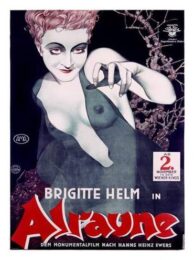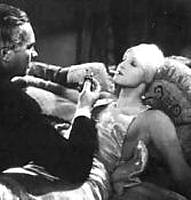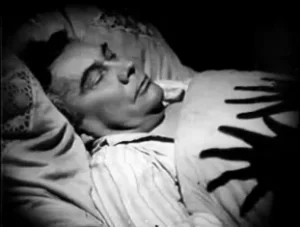This German silent is the most famous of the many adaptations of Hanns Heinz Ewers’ ALRAUNE, and with good reason. The film’s chilly atmosphere, perverse storyline and stunning lead performance by the incomparable Brigitte Helm make for a unique and impacting viewing experience.
Hanns Heinz Ewers’ ALRAUNE, initially published in Germany in 1911, was the second entry in the author’s Frank Braun trilogy (THE SORCERER’S APPRENTICE and VAMPIRE came first and third) and a bonafide classic. A fascinating variation on the Frankenstein concept, it told the taboo-shattering tale of a soulless woman named Alraune, or Mandrake, the product of an experiment in artificial insemination who seduces and drives several men to madness, including her own scientist “father.”
Four separate films were adapted from Ewers’ novel. The first appeared in 1918, a Hungarian drama now believed to be lost. The 1928 film under discussion followed, and remains the best known of the bunch (though ironically not the easiest to find). Next was a German-made sound version in 1930 that starred the previous film’s headliner Brigitte Helm, and finally another German version starring Erich Von Stroheim made in 1952. As of this writing I’ve only viewed the 1928 ALRAUNE, but find it difficult to believe any of the other films could possibly match (much less surpass) it.
Professor Jacob ten Brinken decides to conduct an inhumane experiment. Inspired by the legend of the Mandrake root believed to sprout from the semen of hanged men, Jacob hits upon the idea of creating a woman through artificial insemination. To this end he injects the semen of a condemned murderer into the womb of a prostitute, resulting in the birth of Alraune, a.k.a. Mandrake.
From the start Alraune is a problem child, terrorizing the nuns at the Catholic boarding school she attends. Before long Alraune runs away from the place together with a smitten suitor; her callous nature reveals itself during a train ride where she blows off her suitor in favor of a horny magician. Alraune accompanies the magician to the circus he performs in and briefly becomes part of his stage act—but Alraune’s creator is combing the countryside for her, and eventually tracks her down.
Jacob whisks Alraune back to his home, where he keeps a close eye on her. It’s clear he harbors none-too-submerged incestuous desires for her, and that Alraune, being a soulless, calculating creature, is fully aware of this fact. Yet she continues seducing unsuspecting men, at least until she stumbles upon Jacob’s diary and learns the horrific truth of her existence. Alraune then becomes determined to do Jacob ten Brinken in…by seducing and driving him mad!
Fans of Hanns Heinz Ewers’ novel will find that this adaptation plays fast and loose with the text. Writer/director Henrik Galeen pays lip service to Ewers’ overall concept but refashions the narrative to suit his needs, turning it into a perverted love story centered on Alraune and her lecherous father, while the novel’s protagonist Frank Braun (here renamed Franz) is relegated to what amounts to an extended cameo.
But there’s no question that Galeen’s approach works. In place of Ewers’ wild, decadent narrative the film contains an underlying current of apprehension that steadily builds, and all-but erupts in the delirious climax. Along the way Galeen creates many unforgettable images, such as Alraune freezing a pair of ravenous lions in place with her icy stare, and the clawlike shadows of her clutching hands upon her father’s sleeping body as she silently plots his doom.
On the downside the film takes some time to get going, with a somewhat confusing first act in which the creation of Alraune is never adequately fleshed out. But once Brigitte Helm enters the picture the film ignites. Helm’s screen presence is a commanding one, at once innocent and predatory, off-putting and seductive. Previous to this film Helm was known for playing the robotic Maria in METROPOLIS, and again imparts a distinctly inhuman aura as the soulless Alraune. The legendary filmmaker/actor Paul Wegener (creator/star of classics like THE STUDENT OF PRAGUE, 1913 and DER GOLEM, 1920), as the perverted Professor ten Brinken, matches Helm in an admirably unshowy performance.
But for all that Henrik Galeen, despite his brilliance, never quite matched the filmmaking genius of his contemporaries Wegener, Fritz Lang or F.W. Murneau. That’s evident in ALRAUNE’S tacked-on happy ending, a thoroughly unconvincing bit of whimsy that doesn’t negate the brilliance of all that came before, but does lessen it.
Vital Statistics
ALRAUNE
Ama-Film GmbH
Director: Henrik Galeen
Producer: Helmut Schreiber
Screenplay: Henrik Galeen
(Based on a novel by Hanns Heinz Ewers)
Cinematography: Franz Planer
Cast: Brigitte Helm, Paul Wegener, Ivan Petrovich, Wolfgang Zilzer, Louis Ralph, Hans Trautner, John Loder, Mia Pankau, Valeska Gert, Georg John, Alexander Sascha, Heinrich Schroth




